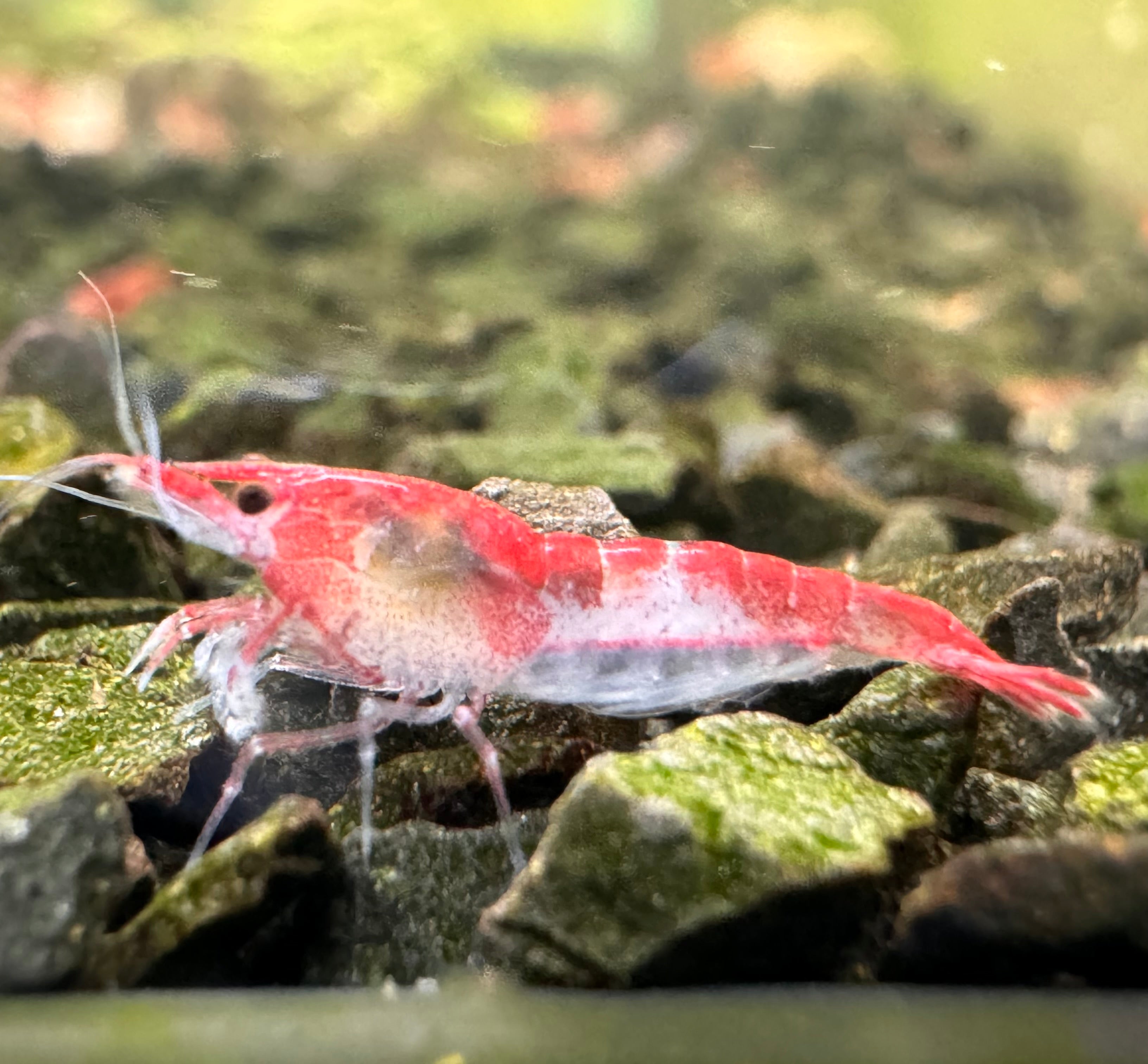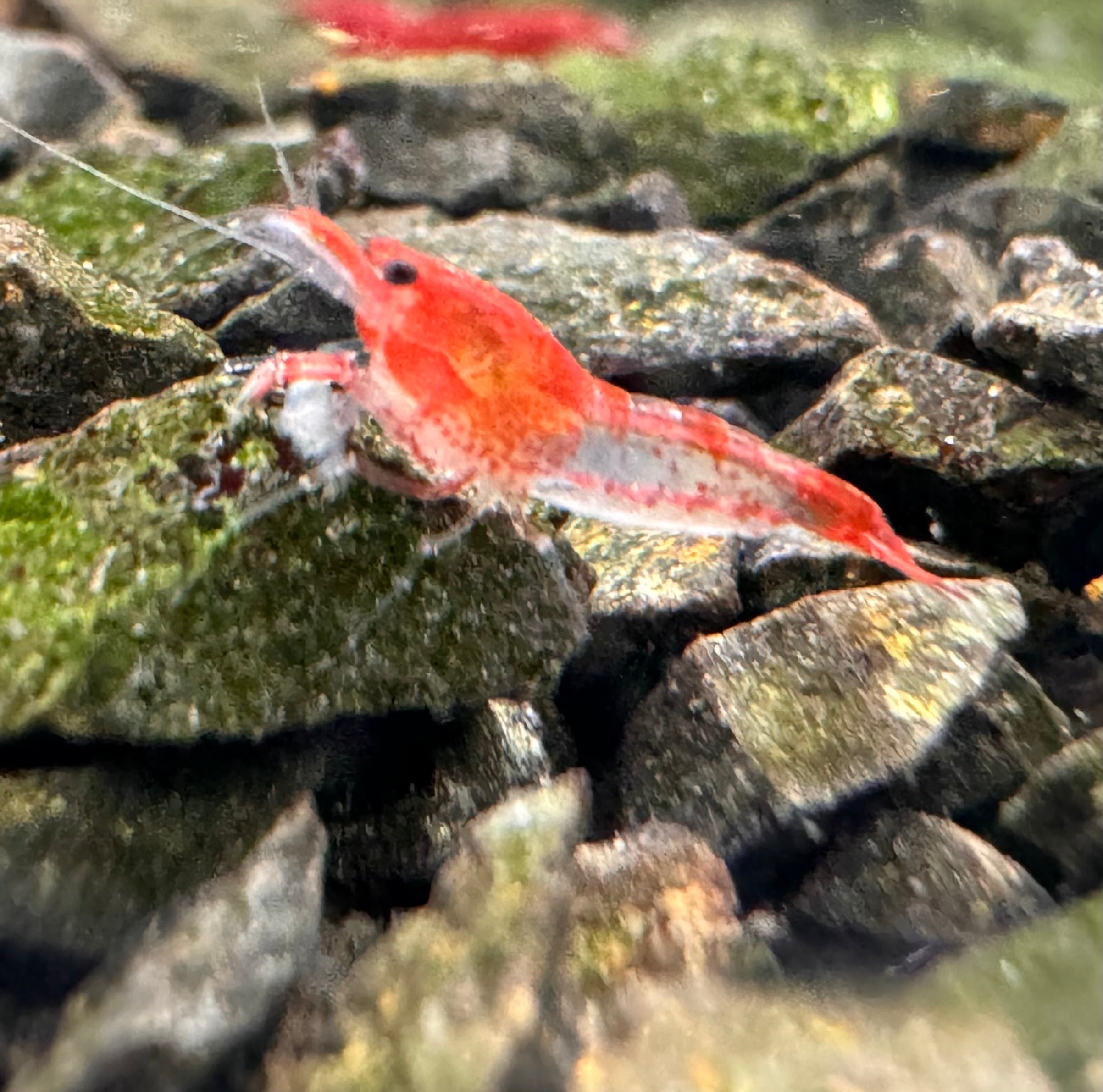Cherry Shrimp - Red Rili 1cm
Order today - receive it in as little as 3-5 days.
Return within 30 days of purchase. Duties & taxes are non-refundable.
Guarantee Safe Checkout

Cherry Shrimp - Red Rili 1cm
Red Rili Shrimp - Colorful Freshwater Shrimp for Your Tank
Want to brighten up your aquarium? The Red Rili Shrimp is your answer. These freshwater shrimp are loved by many in Australia and worldwide. They stand out with their bright red colours and interesting ways of moving.  At Micro Aquatic Shop, we're proud to offer top-quality Red Rili Shrimp. They're perfect for both new and experienced aquarium owners. These shrimp will add beauty and excitement to your tank.
At Micro Aquatic Shop, we're proud to offer top-quality Red Rili Shrimp. They're perfect for both new and experienced aquarium owners. These shrimp will add beauty and excitement to your tank.
Key Takeaways
- Red Rili Shrimp are vibrant and popular freshwater aquarium inhabitants
- They thrive in a variety of tank setups, making them a versatile choice
- Micro Aquatic Shop is a reliable source for these stunning shrimp in Australia
- Red Rili Shrimp are known for their captivating red colouration and intriguing behaviours
- Adding Red Rili Shrimp to your aquarium can bring a new level of beauty and interest
Understanding Red Rili Shrimp: A Stunning Freshwater Addition
The aquarium hobby is growing fast in Australia. More people are drawn to dwarf shrimp, nano shrimp, and vibrant shrimp. The Red Rili Shrimp is especially popular, known for its beauty.
Origin and Natural Habitat
The Red Rili Shrimp comes from Taiwan's clear streams and rivers. They are loved by aquarium fans for their exotic look and bright colours. They add a special touch to any freshwater tank.
Physical Characteristics
The Red Rili Shrimp has a striking red and clear look. They grow up to 2-3 centimetres long. Their small size and elegant shape make them a joy to watch.
Behaviour Patterns
Red Rili Shrimp are known for their lively behaviour. They swim in groups, showing off their bright colours. Their calm nature and easy adaptability make them great for community tanks.
Setting Up the Perfect Tank Environment
Keeping freshwater shrimp, like the Red Rili, right is key. We know how important a good home is for these tiny creatures. It's all about creating a space that meets their needs. To make the best home for our Red Rili shrimp, we need to think about a few things:
- Tank Size: Red Rili shrimp do well in tanks of at least 5 gallons (19 litres). This size lets them move around, find food, and even breed without feeling cramped.
- Substrate: A soft, fine substrate like sand or small gravel is perfect for them to dig and search. Stay away from sharp or rough materials that could hurt them.
- Plants and Decorations: Adding live plants and hiding spots, like driftwood or rocks, makes the tank more interesting. These not only look good but also give our shrimp places to hide and find food.
- Filtration: Good filtration is vital for keeping the water clean for our shrimp. Choose a gentle, low-flow filter. Red Rili shrimp like calm water.
By focusing on these points, we can give our Red Rili shrimp the best place to live. They'll be happy and show off their bright colours in our tanks.
Essential Water Parameters for Red Rili Shrimp
Keeping the right water conditions is key for our Red Rili Shrimp. These freshwater shrimp are great aquarium pets. Let's look at the important water parameters to keep your shrimp happy and healthy.
Temperature Requirements
Red Rili Shrimp like a temperature between 20-26°C (68-79°F). This temperature helps them stay active and healthy. Try not to change the temperature too much, as it can stress them out.
pH and Water Hardness
They do best in a pH of 6.0-7.5, which is slightly acidic to neutral. They also need moderately hard to hard water, with a general hardness of 6-12 dGH. Keeping the pH and water hardness right is crucial for their growth and moulting.
Water Quality Maintenance
Good water quality is vital for your shrimp's health. Do partial water changes of 20-25% every 1-2 weeks. This helps keep nitrates, nitrites, and ammonia low. Use a quality water test kit to check these levels and adjust as needed. Also, make sure your aquarium is well-filtered and oxygenated for a healthy environment. By managing temperature, pH, water hardness, and water quality, you can create a great home for your Red Rili Shrimp. Enjoy their vibrant presence in your aquarium.
Feeding Your Red Rili Shrimp Successfully
Feeding your dwarf shrimp and nano shrimp right is key to their health and colour. We'll look at what they need to eat to stay healthy. Feeding your Red Rili Shrimp a variety of foods is important. They need both commercial shrimp foods and natural foods. This ensures they get all the nutrients they need. Here are some good food options:
- Commercial shrimp foods: Pick high-quality pellets, flakes, or powders made for dwarf or nano shrimp. These have proteins, carbs, and vitamins.
- Natural foods: Add blanched veggies like spinach, zucchini, or carrots. Also, try dried leaves, algae wafers, and biofilm-covered driftwood or rocks.
- Live foods: Give them live treats like daphnia, brine shrimp, or microworms. This adds variety and makes them forage naturally.
 Feed them small meals often, not one big meal. This is like their natural way of eating. It keeps them fed all day. Don't overfeed, as this can harm the water quality. By following these tips, your Red Rili Shrimp will stay healthy and colourful. A balanced diet is essential for their long-term health and beauty.
Feed them small meals often, not one big meal. This is like their natural way of eating. It keeps them fed all day. Don't overfeed, as this can harm the water quality. By following these tips, your Red Rili Shrimp will stay healthy and colourful. A balanced diet is essential for their long-term health and beauty.Breeding and Population Management
Red Rili Shrimp are a stunning freshwater species. Many enthusiasts want to grow thriving colonies in their aquariums. To do this, it's important to know the best breeding conditions and how to manage the population. Let's dive into this interesting part of caring for Red Rili Shrimp.
Breeding Conditions
Red Rili Shrimp are easy to breed in a well-set-up aquarium. The main things needed for successful breeding are:
- Stable water parameters: Keep the temperature, pH, and water hardness levels consistent.
- Ample hiding spots: Give lots of plants, driftwood, and rocky structures for the shrimp to hide and breed.
- Optimal feeding: Feed a varied diet rich in protein, biofilm, and algae to support the shrimp's energy needs.
Caring for Shrimplets
After the female Red Rili Shrimp releases the tiny shrimplets, they need special care. Make sure the aquarium has:
- Fine-mesh sponge filters to keep the shrimplets from getting sucked in.
- Plenty of microfauna and biofilm to support the shrimplets' nutritional needs.
- Dense vegetation and decor to offer hiding places and reduce cannibalism.
Population Control Tips
While Red Rili Shrimp breed a lot, it's important to keep the population balanced. Here are some tips for managing the colony:
| Tip | Benefit |
| Regular culling of excess shrimp | Prevents overcrowding and resource competition |
| Introducing natural predators | Allows for sustainable population control |
| Separating males and females | Limits breeding and population growth |
By understanding how Red Rili Shrimp breed and using smart population management, aquarists can enjoy their vibrant colours and captivating behaviours for years.
Tank Mates and Community Setup
Setting up a vibrant aquarium for our aquarium pets is all about choosing the right tank mates for our nano shrimp. The vibrant shrimp, like the Red Rili Shrimp, do best in a balanced community. They live well with other species that are compatible. When picking tank mates for Red Rili Shrimp, their peaceful nature is key. These nano shrimp love a calm place to explore and eat. Fish like Corydoras catfish, Tetras, and Rasboras are great friends. They don't bother our shrimp.
- Corydoras catfish: These bottom-dwellers live well with Red Rili Shrimp. They help keep the tank clean.
- Tetras: Tetras, like Neon and Cardinal Tetras, add colour to the tank. They don't disturb our nano shrimp.
- Rasboras: Rasboras, like Harlequin and Chili Rasboras, are peaceful. They're great friends for our Red Rili Shrimp.
But, we should avoid some fish. Big, predatory fish or fin-nippers can harm our aquarium pets. By choosing the right tank mates, we can make a happy community. This lets our Red Rili Shrimp shine with their beautiful colours.
Conclusion
The Red Rili Shrimp are a great choice for any freshwater aquarium. They have beautiful colours, are very calm, and fun to watch. They add a lot of joy to your tank. We've talked about how to keep Red Rili Shrimp happy and healthy. This includes knowing where they come from, creating the right tank, and feeding them well. We hope you're now ready to bring these lovely shrimp into your home. If you want to brighten up your tank, visit Micro Aquatic Shop. They have a big selection of Red Rili Shrimp for aquarium lovers in Australia. They're known for their quality and service, so you can trust them to find the best freshwater shrimp for you.
FAQ
What are the key features of Red Rili Shrimp?
Red Rili Shrimp are a stunning freshwater shrimp species. They have become popular in the aquarium hobby. Their vibrant red and transparent colouration makes them a beautiful addition to any tank.
Where do Red Rili Shrimp come from?
Red Rili Shrimp are native to Taiwan. They were first discovered in the wild there. Now, they are a favourite among aquarium enthusiasts worldwide for their unique appearance and easy care.
What size tank do Red Rili Shrimp need?
We recommend a 5-gallon (19 litres) tank for a small group of Red Rili Shrimp. This size tank gives them enough space to thrive and breed. It also allows for hiding spots and aquatic plants they prefer.
What water parameters are ideal for Red Rili Shrimp?
Red Rili Shrimp need specific water conditions to stay healthy. The ideal temperature is between 68-82°F (20-28°C). They prefer a pH of 6.5-8.0 and moderate water hardness. Regular partial water changes are also key for these delicate shrimp.
What should I feed Red Rili Shrimp?
Red Rili Shrimp are omnivorous and enjoy a varied diet. They like commercial shrimp pellets or flakes, fresh vegetables, algae wafers, and sometimes boiled vegetables or protein-rich foods like frozen brine shrimp or bloodworms.
Can Red Rili Shrimp be bred in the aquarium?
Yes, Red Rili Shrimp are relatively easy to breed in a well-established aquarium. They need the right water parameters, hiding spots, and a mature biofilm-covered substrate. This will help encourage successful breeding and the healthy development of their offspring, known as "shrimplets".
What are some good tank mates for Red Rili Shrimp?
Red Rili Shrimp can be kept with peaceful community fish and other invertebrates. Good tank mates include Corydoras catfish, Pygmy Cories, Chili Rasboras, and other peaceful dwarf shrimp species. Avoid aggressive or predatory fish that may see the shrimp as a food source.
| Quantity |
1 juvie 1cm |
|---|



